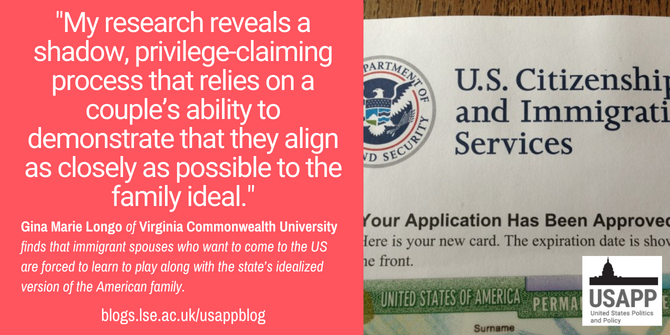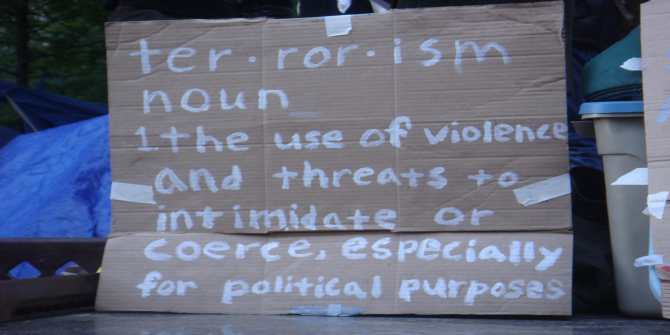 While US policy allows citizens to bring their immigrant spouses to the country, this has not always been the case, and despite immigration reform, immigration bureaucracy can often exclude those who do not conform to an idealized version of the American family. In new research, Gina Marie Longo examines how couples use online immigration advice forums to help them to decipher what behaviors they must adopt to achieve a positive decision. She finds that citizens must learn and demonstrate they adhere to the unspoken expectations of the state – expectations which often uphold racialized and gendered understandings of belonging and citizenship.
While US policy allows citizens to bring their immigrant spouses to the country, this has not always been the case, and despite immigration reform, immigration bureaucracy can often exclude those who do not conform to an idealized version of the American family. In new research, Gina Marie Longo examines how couples use online immigration advice forums to help them to decipher what behaviors they must adopt to achieve a positive decision. She finds that citizens must learn and demonstrate they adhere to the unspoken expectations of the state – expectations which often uphold racialized and gendered understandings of belonging and citizenship.
Today, any US citizen can petition for an immigrant visa on behalf of a foreign partner, allowing them to cross the border, secure employment, and naturalize quickly. But this has not always been the case. Since its earliest days, the US government has been interested in policing access to immigration and citizenship using what the state defines as a proper family and practices to interpret or make policies and discipline the citizenry. The notion of ”the all-American family” has been ideally imagined as white, middle-classed, patriarchal, and with biological children. Once, laws explicitly tied US citizenship to race and gender using this family ideal. Women who married immigrant men had their citizenship status stripped. Anti-miscegenation laws prohibited interracial unions. The immigration quota system, which limited the entry of non-white immigrants, stayed in place until the 1950s. Specific policies halted the entry of Japanese and Chinese immigrants based on perceptions of their sexual immorality.
Discriminatory laws were eventually replaced by universally-worded policies, particularly during the Civil Rights era. So, why do we still observe racialized and gendered inequalities regarding spousal reunification? How does the ease or difficulty of obtaining a green card for a foreign spouse persist across the configurations of couples’ demographic, given the neutrally-written immigration policies meant to eliminate discrimination?
Regulating immigration and citizenship through bureaucracy
In the years following immigration reform, state bureaucrats and policymakers had to reimagine new ways to police the family to continue to control its interests. So, state actors inside bureaucracies began to interpret policies using the discourses about the ideal, ”all-American” family. The spousal reunification process requires couples to submit evidence packages to officials demonstrating that their relationships are genuine and not simply for immigration purposes. Officials scrutinize couples’ evidence using these ideas of the ”all-American” family to define what counts as “genuine” and “red flags” indicating potential fraud, such as age difference, money exchanges, and vast cultural differences. Those couples who cannot conform are considered suspicious and denied. So, regulating immigration and citizenship of undesirable populations becomes based upon these interpretations.
It is easy to foster an image of the “bad” immigration officer and the “good” petitioning couple because scholars have focused on the role of state actors in the evaluation process. But this is only part of the process. My work focuses on the couples’ roles within the process that the system forces them to play. Couples whose relationships have potential indicators of marriage fraud (i.e., red flags) must adequately address this in their evidence packages, lest they get denied.
Immigration officials do not disclose reasons for denying certain petitions other than to say the relationship appears to be strictly for immigration purposes. While they might generically list what documents or artifacts constitute potential proof, like birth certificates, bank statements, and so on, officers do not explain how they evaluate these items. Nevertheless, US petitioners still must decipher what they need to sway the decision in their favor. Herein lies the problem.
Learning about unspoken expectations of the state from online forums
I recently conducted a study investigating how US petitioners made moral judgments about the family to create evidence packages for their cases. To do this, I turned to the conversation archives of a free, self-help US immigration online forum where US petitioners clarify US criteria and exchange advice with other petitioners whose petitioners were successful. I analyzed conversations from two regional sub-forum populated with white and Black US citizen women: The Sub-Saharan Africa forum, where women petition for regional Black men, and the Middle East/North Africa (MENA) forum, where participants apply for Arab men.

Green card!” (CC BY-NC 2.0) by judemat
My research reveals a shadow, privilege-claiming process that relies on a couple’s ability to demonstrate that they align as closely as possible to the family ideal. Although citizens have the right to petition for their partner, the approval of their petitions is a privilege. Thus, citizens must learn the unspoken expectations of the state and then craft their evidence packages accordingly. Therefore, online forums like those similar to my data source, immigration lawyers, and non-profit organizations, to name a few, crowdsource advice on negotiating the state’s expectations.
In my study, for example, I found that women petitioners interpret US immigration policy requirements and “red flags” with intersectionally organized racial ideologies, behaviors, and expectations about the US hegemonic family. Petitioners take charge of profiling couples for signs of fraud, drawing on socio-historically specific stereotypes of African American men, Arab men, and their family formation practices. They make racialized judgments and assumptions about foreign partners’ reproduction, sexual agency, and breadwinning practices based on these stereotypes, then try to accentuate or deemphasize certain qualities about their relationships within their evidence packages. Citizens mobilize combinations of ”character status assets,” such as race, gender, and class identities, and performances of hegemonic family norms to showcase their worthiness to immigration officials to “earn” the privilege of visa approval.
Consequently, petitioners become brokers of marriage migration policy as they fill in the information gaps. They become complicit in upholding the racialized and gendered understandings of belonging and citizenship that are no longer written in the law, perpetuating the systemic privilege-claiming process. Citizens may not agree with the process or dislike participating in it, but they have no choice. Petitioners who do not ”play along” risk the chance of denial, which means separation from their partners, heartache, and financial loss. Thus, they must engage in state- and nation-building to secure the chance for their family’s future.
- This article is based on the paper, “Moral Lines of Credit: Forging Race Projects, Citizenship, and Nation on online U.S. Spousal Reunification Forums,” in Migration Politics.
- Please read our comments policy before commenting.
- Note: This article gives the views of the author, and not the position of USAPP – American Politics and Policy, nor the London School of Economics.
- Shortened URL for this post: https://bit.ly/3WRM3EM






